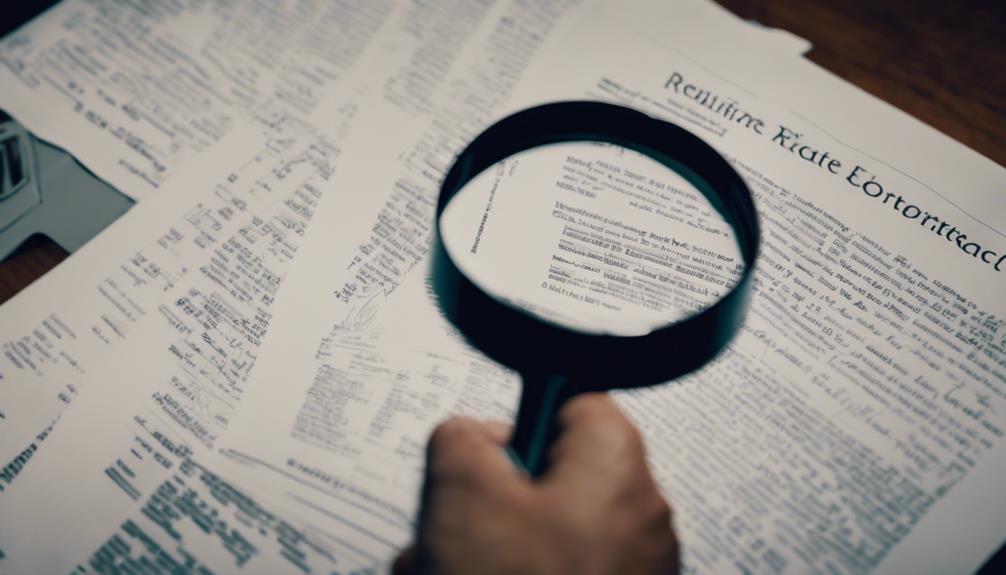In the intricate landscape of real estate transactions, legal services play a crucial role in ensuring smooth and secure deals. From deciphering the complexities of contracts to navigating the intricacies of property transfers, the need for comprehensive legal guidance is undeniable.
As the cornerstone of any successful property transaction, understanding how to effectively utilize real estate legal services can be the determining factor between a seamless process and potential pitfalls.
Let's explore further how these essential services can safeguard your interests and offer peace of mind in the dynamic world of real estate.
Understanding Real Estate Contracts

Navigating the complexities of real estate transactions often begins with a thorough understanding of the intricacies involved in real estate contracts. These legally binding agreements outline the terms and conditions of a property transaction, governing the rights and obligations of both buyers and sellers. When delving into real estate contracts, it is crucial to pay close attention to interpreting clauses and negotiating terms to ensure that the agreement aligns with the interests of all parties involved.
Interpreting clauses within a contract requires a keen eye for detail and a solid grasp of legal terminology. Each clause serves a specific purpose and can have significant implications on the overall transaction. By carefully analyzing these clauses, potential issues or misunderstandings can be identified and addressed before they escalate.
Negotiating terms is a fundamental aspect of real estate contracts. Both buyers and sellers aim to secure terms that are favorable to their respective positions. Skilled negotiators can leverage market conditions, property specifics, and legal knowledge to craft agreements that protect their clients' interests while fostering a mutually beneficial deal.
Conducting Title Searches
Conducting thorough title searches is a critical step in real estate transactions to verify property ownership and assess any potential liens or encumbrances. Title searches involve examining public records to trace the chain of ownership of a property and ensure that the seller has the legal right to transfer ownership. This process helps identify any existing liens, mortgages, or other encumbrances that could affect the property's title. By conducting a comprehensive title search, potential issues can be addressed before closing the deal, protecting both the buyer and the lender.
Title insurance is often recommended to safeguard against any undiscovered title defects. Title insurance policies provide coverage for various issues that may arise after the property purchase. This type of insurance offers protection against financial loss due to title problems and offers peace of mind to property owners. Understanding the chain of ownership through a meticulous title search is fundamental in real estate transactions to ensure a smooth transfer of property rights.
Handling Property Transfers

When ensuring the smooth transfer of property rights in real estate transactions, handling property transfers requires meticulous attention to legal details and documentation. The transfer process involves various steps to guarantee a legally valid change of ownership. One crucial aspect is deed preparation, which involves drafting the document that legally transfers the property from one party to another. Deed preparation typically requires specific information about the property, the parties involved, and the terms of the transfer.
In handling property transfers, it is essential to follow the legal requirements of the jurisdiction where the property is located. This includes ensuring the deed is properly executed, notarized, and filed with the appropriate government office. Any errors or omissions in the deed preparation can lead to delays or even legal challenges in the future. Therefore, engaging a qualified real estate attorney to oversee the transfer process can help mitigate risks and ensure a seamless transition of property ownership.
Resolving Boundary Disputes
Addressing boundary disputes in real estate transactions demands a comprehensive understanding of property boundaries and legal frameworks. When resolving such disputes, it is crucial to review boundary agreements that may exist between the involved parties. These agreements outline the specific boundaries of each property and can help clarify ownership rights.
In cases where boundary agreements are absent or unclear, disputes often arise due to property encroachments. Property encroachments occur when a structure or part of a property extends beyond its legal boundaries onto an adjacent property. Resolving these disputes requires careful examination of property surveys, deeds, and local zoning regulations to determine the accurate boundary lines.
Legal professionals play a significant role in mediating boundary disputes by interpreting relevant laws and documents to establish rightful property ownership. By addressing boundary disputes promptly and accurately, real estate transactions can proceed smoothly, avoiding potential legal complications in the future.
Navigating Zoning Regulations

Navigating through zoning regulations is essential in real estate transactions to ensure compliance with local ordinances and land use restrictions. Zoning regulations dictate how land can be utilized within a specific area, outlining permissible land uses, building sizes, and structures. Understanding these regulations is crucial to avoid potential legal issues and financial setbacks during real estate transactions.
Zoning variances are permissions granted by local governments to deviate from the standard zoning regulations for a particular property. Securing a zoning variance can be a complex process that often requires legal expertise to navigate successfully. It involves presenting a case to local zoning authorities, demonstrating why the variance is necessary and how it aligns with the overall community development goals.
Land use regulations further specify how properties can be utilized, considering factors such as environmental impact, traffic flow, and neighborhood aesthetics. Real estate legal services play a vital role in interpreting and ensuring compliance with these regulations to facilitate smooth and legally sound real estate transactions. By understanding and adhering to zoning and land use regulations, real estate professionals can navigate the complexities of property development and transactions effectively.
Frequently Asked Questions
Can a Real Estate Lawyer Help With Landlord-Tenant Disputes or Lease Agreements?
Yes, real estate lawyers can provide invaluable assistance with landlord-tenant disputes and lease agreements. They offer legal guidance, negotiate terms, draft contracts, and represent clients in court if necessary. Their expertise ensures that your rights are protected.
What Are the Potential Legal Implications of Purchasing a Property That Is Part of a Homeowner's Association (Hoa)?
Purchasing a property within a homeowner's association (HOA) may bring potential legal implications due to adherence to HOA regulations and property restrictions. Violations may lead to fines, lawsuits, or even liens on the property.
How Can a Real Estate Lawyer Assist in Resolving Issues Related to Environmental Concerns or Hazards on a Property?
A real estate lawyer can address environmental compliance issues by conducting due diligence, negotiating with regulatory agencies, and advising on hazard mitigation strategies. They can help resolve disputes related to site contamination, toxic exposure, and other environmental concerns.
Are There Any Legal Considerations to Keep in Mind When Buying or Selling a Property Through a Short Sale or Foreclosure?
Legal considerations when buying or selling real estate through a short sale or foreclosure include understanding the intricacies of short sale negotiations and the foreclosure process. It is crucial to navigate these transactions with the guidance of a knowledgeable real estate lawyer.
How Can a Real Estate Lawyer Help With Issues Related to Easements, Encroachments, or Other Property Restrictions?
A real estate lawyer can assist in resolving disputes related to property boundaries, easements, encroachments, and other restrictions. They provide legal guidance on property rights, review documents for compliance, and work to protect your interests.
Conclusion
In conclusion, essential real estate legal services encompass:
- Understanding contracts
- Conducting title searches
- Handling property transfers
- Resolving boundary disputes
- Navigating zoning regulations
These services are crucial in ensuring smooth and lawful transactions in the real estate industry.
By seeking legal guidance and expertise, individuals can protect their interests and investments in property dealings.
It is imperative to engage with qualified legal professionals to navigate the complexities of real estate transactions effectively.










